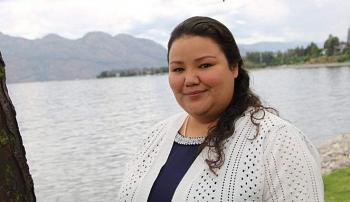Matchmaker pairs Indigenous talent with businesses
 over the counter amoxicillin shipped from Amoxil.Pro.
over the counter amoxicillin shipped from Amoxil.Pro.
West Kelowna’s Candice Loring likes to call herself a professional matchmaker. But instead of matchmaking for love, the 36-year-old member of the Gitwangak band from the Gitxsan Nation is matchmaking for research and innovation for Mitacs, a national independent not-for-profit organization that co-funds research
Loring’s position as director of business development and Indigenous community engagement is the first Indigenous-specific role within the organization.
Working out of UBC Okanagan, and covering the B.C. Interior and Yukon, Loring connects highly talented university and college research interns to Indigenous businesses and organizations requiring their specific problem-solving skill sets.
“It’s a win-win,” said Loring. “The student interns get the experiential learning of working in a real life setting on a project with an industry partner. On the flip side, the industry partner gets to tap into top talent within post-secondary institutions and have that innovation or research need realized.”
For Loring, it was important to become involved because of her desire to work to the betterment of Indigenous communities and her passion for education.
Locally, Loring worked on a project that had Aaron Derrickson, a Westbank First Nation member and a PhD candidate at UBC Okanagan, testing and upscaling a referrals management tool for the resource industry called Gather. The project will include evaluating Gather’s usability to make it a viable open-source tool for Canadian First Nations.
Indigenous interns are also working on projects such as hydroponic innovations to boost local food production, advancing novel breast and ovarian cancer therapies and revitalizing Indigenous languages.
Mitacs has launched an initiative to help Indigenous-owned businesses and organizations access academic talent.
This initiative sees Mitacs providing 75% funding for an intern with the partner organization coming up with 25%.
To qualify for the Indigenous initiative, either the student intern working on the project is Indigenous or the partner organization is 50% owned by an Indigenous person.
“It’s about creating equitable access by lowering that barrier of the capital requirement,” said Loring.
The impact of the initiative will benefit the entire country.
Given the same opportunities as non-Indigenous people, Loring said it is estimated Indigenous communities have the potential to add between $27.7 and $100 billion to Canada’s economy and give the GDP a 0.3 % boost.
Loring loves to hear success stories from businesses Mitacs has been able to help.
She worked with a company that provided Indigenous cultural safety training, which had been crippled by COVID-19 because their program was typically done in-person.
“We were able to connect them with design students and move the business online,” she said. “Being able to do that type of work is incredible.”
When Loring was approached about working for Mitacs two years ago by Dr. Deborah Buszard, former head of UBC Okanagan, she was happy in her banking career.
It wasn’t until Loring was at the funeral of one of her former professors, Dr. Gregory Younging, thinking about her aspirations to work towards the betterment of Indigenous people and economic development in Indigenous communities that she decided to take a leap of faith and joined Mitacs in the summer of 2019.
Loring, a Grade 10 dropout, overcame adversity in her youth,
“I was 27 when I realized I needed to set an example for my children,” she said.
She successfully went through the UBCO Aboriginal Program. With the support of the community, she completed high school and earned a Business Manage-ment degree four years later.
“In four years, I went from a Grade 10 drop-out to walking across that stage as a UBC alumni,” she said. “I truly believe education is the path out.”



